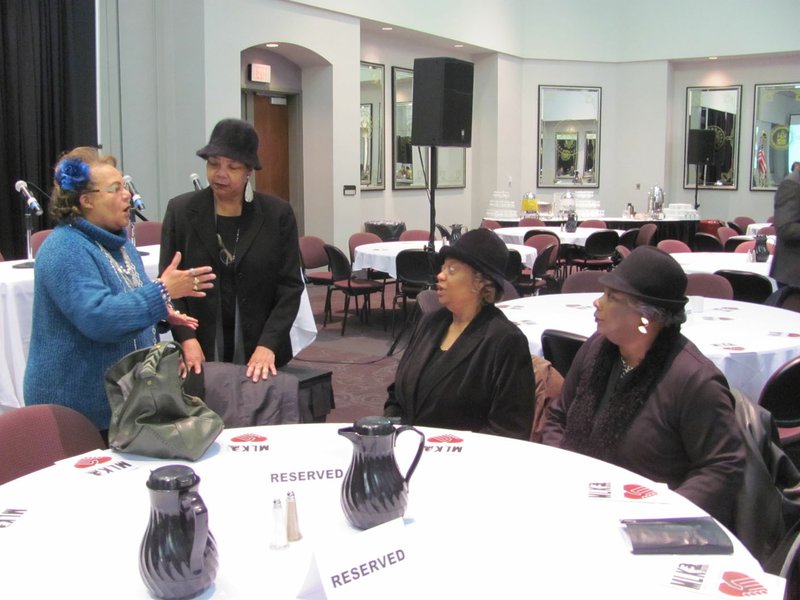FORT SMITH -- Desegregating schools in Fort Smith was not as contentious as it was in other parts of the state and country in the 1960s, a local legislator said Monday during the city's observance of Dr. Martin Luther King Jr.'s Birthday.
"We had no monuments to racial strife in Fort Smith," said Rep. George McGill, D-Fort Smith.
The observance of what would have been the civil-rights leader's 89th birthday Monday included a panel discussion on the desegregation of Northside High School; a march on the campus of the University of Arkansas at Fort Smith; a parade through downtown; and visits from civil-rights notables as well as the first black director of the U.S. Marshals Service, who were guests of the U.S. Marshals Museum.
McGill recalled the story of H.P. McDonald going to desegregate a downtown lunch counter in the 1960s. When he walked in, he was met by a young man who asked if he could desegregate the restaurant at another time because its owner, his father, was out of town.
McGill said McDonald agreed and returned to the lunch counter without incident when the owner returned.
McGill moderated the panel discussion that included former students from the all-black Lincoln High School who desegregated Northside in 1966. Lincoln High School closed in 1967 after 75 years in existence, and the building was demolished.
Sherry Toliver and other former Lincoln students said they were sorry to leave Lincoln because of the atmosphere at the school in the 1950s and 1960s. Students were happy at Lincoln High School, she said. They competed academically, Toliver said, never had a confidence problem, had good role models and never felt like second-class citizens.
"We were proud to be black people, to come from Lincoln High School," she said.
Toliver said many Lincoln seniors were disappointed with the move to Northside because they weren't able to graduate from Lincoln High School.
Another panel member, Rhonda Vanlue Gray, was the first black teacher at Northside. She was from Alma but was bused to Fort Smith to attend Lincoln High School. Later, she was one of 16 black students to desegregate Alma High School.
Three pioneers of the civil-rights movement -- Leona Tate, Tessie Prevost Williams and Gail Etienne Stripling -- were in attendance at the U.S. Marshals Museum for Fort Smith's "Celebrate the Dream" parade downtown.
The three desegregated McDonogh No. 19 Elementary School in New Orleans in the 1960-61 school year. They were 6 and 7 years old, and they were the school's only students for their first year because the parents of the white children boycotted the school.
"I didn't understand what we were doing at the time," Stripling said. "And now, I just want the kids to realize an education is what they need."
Tate, who heads the Leona Tate Foundation, and Williams said education is the way to promote and enhance racial equality.
Louie McKinney said his role in the civil-ights movement was to show people what he accomplished by being the son of a sharecropper who didn't give up.
McKinney became the first black career deputy to lead the U.S. Marshals Service when he was named acting director in 2001. During his 26-year career with the Marshals Service, McKinney enforced desegregation of Southern public schools as a deputy marshal, worked to keep the peace after American Indian activists took over Wounded Knee in 1973,, worked as a sky marshal to thwart airline hijackings in the 1970s and was in charge of guarding John Hinckley after his arrest for attempting to assassinate President Ronald Reagan.
State Desk on 01/16/2018
